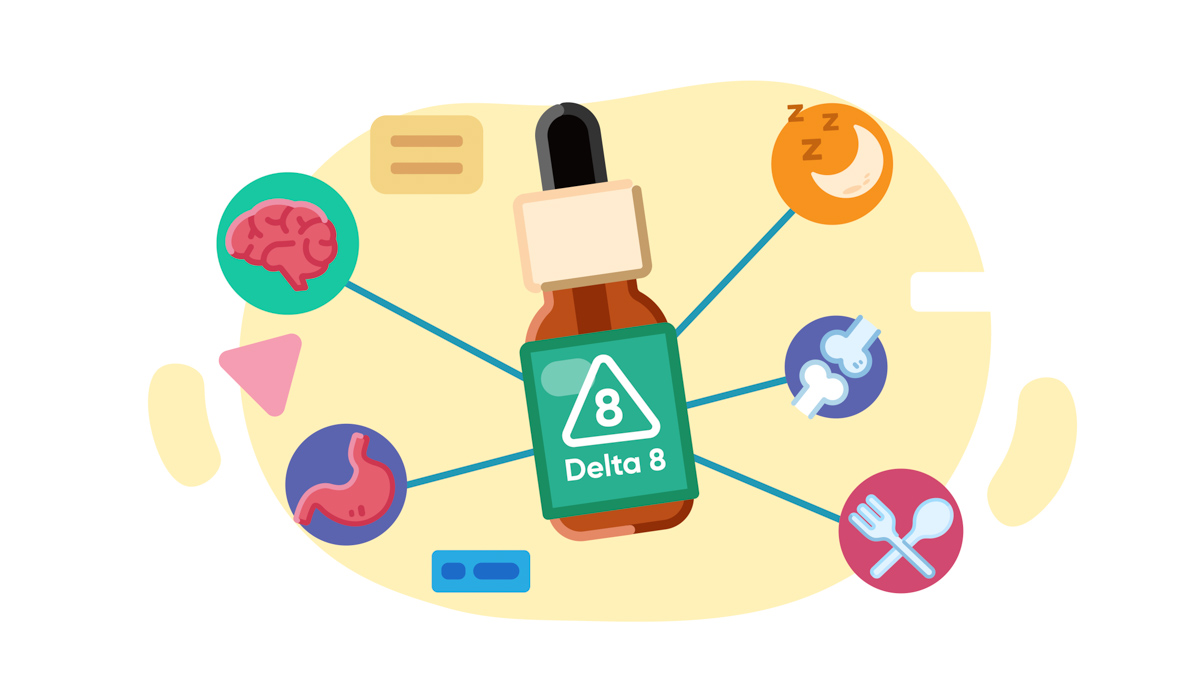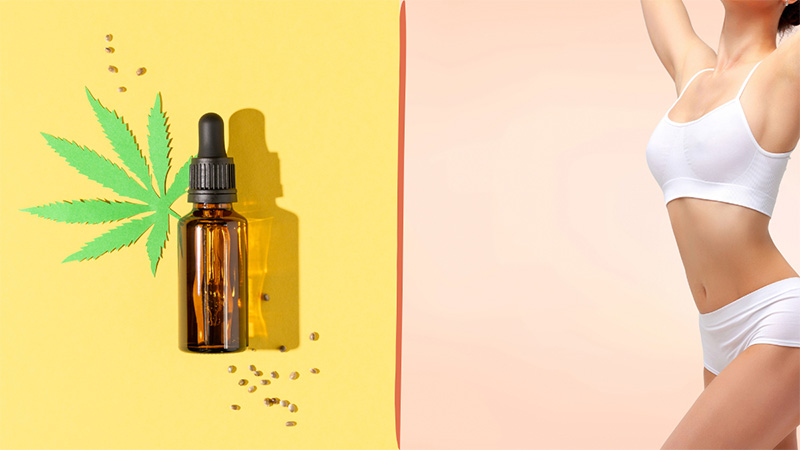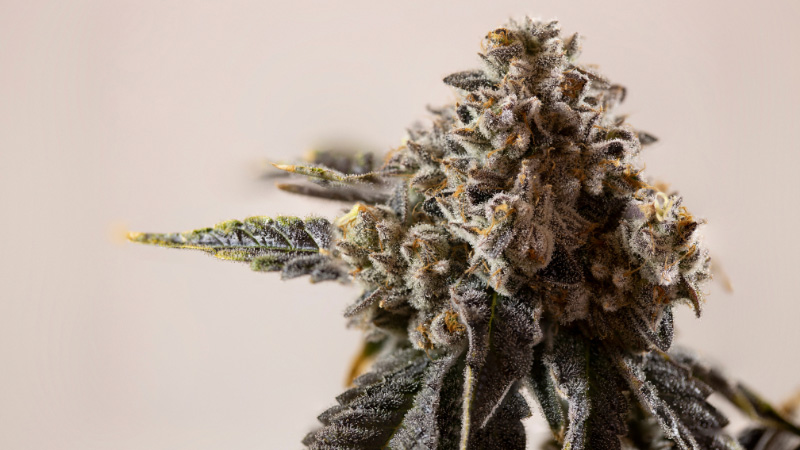What Are the Effects of Delta 8 THC?

It’s hard to find a more versatile plant than cannabis. Every day, we seem to discover more thrilling uses of it — from herbal medicines to biofuel, building materials, and clothes.
Delta-8 THC, a milder version of delta-9 from marijuana, is a cannabinoid discovered in 1965 by Dr. Raphael Mechoulam, known as the “godfather of cannabis research.”
However, decades of ungrounded prohibition have hidden different cannabis molecules and their potential health benefits in plain sight.
As legalization continues to roll across the world, we’re learning more and more about the properties of cannabis and its compounds. So what does make delta-8 THC so desired among cannabis users?
Here we explain delta-8 THC effects on the body and brain and explain potential side effects.
After reading this article, you’ll know how to use delta-8 responsibly to maximize the benefits and avoid health risks.
Delta-8 THC: The Basics
Before we elaborate on the effects of delta-8 THC, it’s important to know what it is and how it’s sourced.
Delta-8 is a minor cannabinoid, meaning that cannabis plants don’t synthesize it naturally in high concentrations.
Delta-8 THC forms as a byproduct of THC’s degradation over time. The lion’s share of THC transforms into CBN, a mildly psychoactive and potentially sedating cannabinoid, and only a fraction of it turns to delta-8 THC.
Delta-8 THC activates the receptors of the endocannabinoid system (ECS). The ECS is responsible for establishing and maintaining balance (homeostasis) between the remaining systems and organs in your body.
Once delta-8 THC enters your bloodstream, it binds to the said receptors, gets broken down by enzymes, and then sends the signals to your body to help it maintain balance and proper function.
Is Delta-8 the Same as THC?
The THC molecule has different variants. What you’re familiar with is delta-9 THC — the primary psychoactive compound in marijuana.
Delta-8 THC is an isomer of delta-9. In plain English, it has almost the same chemical formula, but its structure is slightly different.
Delta-9 THC has a double bond at the ninth carbon chain; meanwhile, delta-8 THC has this bond at the eighth chain.
This difference reduces the delta-8 THC’s binding affinity to cannabinoid receptors in the brain, dampening its potency.
Delta-8 THC is about 50% as potent as delta-8 THC.
Delta-8 THC Effects on the Brain
Since delta-8 THC interacts with the same receptors in the brain as delta-9, it can get you high if you take enough.
However, the psychoactive buzz induced by delta-8 is milder than what you experience after smoking or vaping weed.
Users describe the high as feeling more clear-headed and euphoric – and less intense in its psychedelic stimulation.
Delta-8 THC is less likely to drive you anxious or paranoid in the same dosage range as delta-9 THC.
Most people feel relaxed, elevated, more focused, motivated, and hungry after taking delta-8. The effects may be more energizing or sleepy depending on the potency and terpene profile of your product.
Delta-8 THC Effects on the Body

Delta-8 THC’s interaction with the CB1 receptors in the brain also provides a range of physical benefits.
Pain relief and eased tension are the most commonly reported effects on the body. Delta-8 also activates CB2 receptors, which occur in the peripheral nervous system, immune system, and blood.
By interacting with these receptors, delta-8 THC reduces inflammation and associated discomfort, such as swelling, itching, and burning.
Delta-8 THC also eases nausea and vomiting by calming down the brain area that controls these sensations.
Related: What Are the Effects of Delta-8 Gummies?
Benefits of Delta-8 THC
Although not as well researched as delta-9, delta-8 THC appears to have similar health benefits due to the way it interacts with the ECS.
Here’s a quick wrap-up of delta-8 THC’s positive impacts on health:
- Less intense psychoactive effects
- Improved motivation and focus
- Relief from nausea and vomiting
- Eased pain and reduced inflammation
- Feelings of calmness, relaxation, and comfort
- Increased appetite
- Deeper sleep
The effects of delta-8 THC are usually very pleasant and elevating. It doesn’t stimulate CB1 receptors in the brain to the same extent as delta-9 THC, making it a better alternative for those who are sensitive to the psychedelic nature of marijuana.
The benefits may vary between individuals and aren’t always immediate. Their strength and duration depend mostly on your ingestion method. For example, if you use delta-8 vapes, you should notice them after 5 minutes from your last puff. Tinctures take more time to kick in – usually 30-45 minutes. Edibles hit you with an even greater delay after 60-90 minutes.
Another crucial point is the quality of the product. Poorly manufactured delta-8 extracts might not produce the expected effects, and some of them are downright dangerous due to contamination.
Is Delta-8 THC Safe?
Considering the lower potency and less intense psychoactive effects, delta-8 THC is deemed safe and a favorable alternative to delta-9 THC from marijuana. However, that doesn’t mean it comes without adverse reactions.
Side Effects of Delta-8 THC
You may still experience unpleasant side effects when you take too much, including:
- Dry eyes and mouth
- Drowsiness
- Sedation
- Problems with focus and coordination
- Short-term memory impairment
- Body high
- Anxiety and paranoia (rare)
Delta-8 THC also interacts with a wide range of pharmaceutical medications because it affects the largest metabolic enzyme system in the liver (CYP450). Always talk to your doctor before trying delta-8 products to avoid second-hand side effects.
Delta-8 THC and Other Popular Cannabinoids: What’s the Difference?

The cannabis plant is a botanical powerhouse full of therapeutic compounds, such as cannabinoids, terpenes, and flavonoids.
Together, these molecules work synergistically to optimize your ECS and assist it in bringing the other systems and organs in your body back to balance.
However, each of these compounds contributes to this entourage effect with its unique properties.
Here’s how delta-8 THC compares to other THC isomers and CBD.
Delta-8 THC vs. Delta-9 THC
When people hear “THC,” most of them instantly associate it with delta-9, the primary psychoactive compound in marijuana. Whenever you get high from smoking weed, it’s because delta-9 activates cannabinoid receptors in your brain and central nervous system.
As mentioned earlier, delta-8 is a sort of cousin to this cannabinoid. However, it produces diverse effects when it comes to potency.
Delta-9 THC induces a more intense high than delta-8. Anxiety and paranoia triggered by high doses of delta-9 are the main reasons why people decide to avoid high-THC cannabis.
This is something that happens extremely rarely with delta-8 THC. Delta-8 keeps your mind clear and doesn’t launch the stream of racing thoughts that can drive you into feelings of unease.
Overall, the effects of delta-8 THC are more subtle than delta-9. They take a bit longer to kick in, but the experience isn’t as cerebrally stimulating.
Related: Delta 8 vs. Delta 9 vs. Delta 10
Delta-8 THC vs. Delta-10 THC
Delta-10 THC is the latest discovery by cannabis researchers. Its backstory is fascinating because it was discovered completely by accident in 2020 when California suffered from immense bushfires.
After dropping chemicals across the landscape to cease the fire, some of them ended up on cannabis plants growing in the region.
This triggered an intriguing reaction during extraction as scientists tried to purge the plants of contaminants. Strange crystals started to form within the cannabis trichomes. The closer the researchers examined the plant, the more shocked they became.
The substance turned out to be delta-10 THC, an isomer of delta-9 that formed as a result of an accidental conversion due to the interaction between the said chemicals and cannabis.
Delta-10 THC is even less potent than delta-8 THC, making it a safer pick for new users who have had bad experiences with marijuana.
Delta-8 THC vs. HHC
HHC stands for “hexahydrocannabinol,” it’s a hydrogenated form of THC that has a more stable chemical structure and longer shelf life.
The effects of HHC are less psychoactive than delta-8 THC. Users describe these feelings as deeply euphoric but not intense. The high also embraces the body, bringing a calming wave of relaxation to your muscles and relieving physical stress.
Related: HHC vs. Delta-8 THC and Delta-9 THC
Delta-8 THC vs. THC-O
THC-O is a semi-synthetic analog of THC. It was invented in the 1940s by the army when they tried to come up with a non-lethal incapacitating substance for war captives.
Don’t start off with THC-O if you’ve never tried cannabis. It’s about 3x as potent as delta-9 THC and 6x stronger than delta-8.
Related: THC-O vs. Delta-8 THC and Delta-9 THC
Delta-8 THC vs. CBD
CBD is on the opposite spectrum of effects compared to delta-8 and delta-9 THC. It doesn’t have intoxicating properties, so it won’t get you high.
CBD has a weak binding affinity with cannabinoid receptors. Instead, it modulates the activity of the ECS, prompting it to produce more of its natural endocannabinoids and slowing down their breakdown.
CBD offers a plethora of health benefits, such as relief from anxiety, stress, inflammation, pain, and sleep deprivation. It also provides the body with remarkable antioxidative and neuroprotective properties.
You can add CBD oil to your routine to mitigate the potential side effects of delta-8 THC and increase its therapeutic potential. CBD will reduce the pace at which you build a tolerance to THC.
Related: Differences Between Delta-8 and CBD
Is Delta-8 THC Legal?
Delta-8 THC is in a legal grey area as of this writing.
In 2018, President Trump signed the amended Agricultural Improvement Act of 2018 (Farm Bill). The new law removed hemp and its derivatives from the list of controlled substances — legalizing them at the federal level.
The only condition is that hemp-derived products must contain no more than 0.3% delta-9 THC on a dry-weight basis.
The majority of states accepted the provisions of the Farm Bill, but 14 states outlawed delta-8 products by placing them under the umbrella term “tetrahydrocannabinols” together with delta-9 and other variants.
Currently, you won’t buy delta-8 THC in:
- Alaska
- Colorado
- Delaware
- Idaho
- Iowa
- Montana
- Nevada
- New York
- North Dakota
- Oregon
- Rhode Island
- Vermont
- Utah
- Washington
Final Thoughts on Delta-8 Effects
Although delta-8 THC was discovered in the 1960s, its effects were unknown until the last few years when researchers discovered how to extract usable quantities of delta-8 from hemp.
With half the potency of delta-9 THC, delta-8 effects are milder and deliver less intense cerebral stimulation.
Lower strength translates into a lower risk of anxiety and paranoia — the two side effects of THC that make some people afraid of using cannabis.
If you want to reap the most benefits from delta-8 effects, make sure to source it from a trusted manufacturer that provides batch-specific third-party lab reports on the potency and purity of your product.